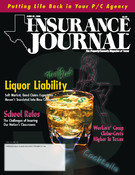According to the Insurance Information Institute (I.I.I.), a number of factors have combined to create a more favorable market for establishments seeking liquor liability insurance, including the responsibility assumed by owners and operators of eating and drinking establishments and stricter state liquor statutes.
Herb Willmes, president of B&W Insurance Service in San Jose, developed his agency’s Liquor Store/Mini-Mart program with $2 million written premium. “Its the ‘most wonderful money-making tool in the world,” he said.
B&W Insurance Service has written hundreds of policies for liquor stores, mini-marts and junior markets and has only experienced one minor claim since 1992. “We collect tens of thousands of dollars in premium,” he said. “The claims are just not a problem.”
Willmes said that B&W sells limits from $100,000 to $1 million. “But the most popular is $300,000 to cover defense costs,” he added.
When writing a policy for a liquor store or convenience store, Don Agheli, president and CEO of Safety Net Insurance Marketing Corp. located in Arcadia, Calif., feels the same way about defense costs as Willmes. “It is essential to purchase liquor liability to cover the defense costs,” he said.
Safety Net is the managing general agent (MGA) for the Golden State Food and Beverage Program, which offers property, commercial general liability (CGL) and liquor liability for food and beverage establishments including restaurants, bars, clubs, lounges and liquor stores.
The Insurance Services Office Inc. (ISO) developed standard forms for liquor liability coverage, CG 00 33 and CG 00 34, that are widely used throughout the industry. The typical coverage for liquor stores includes property, CGL, liquor liability and crime coverage. “If an insured does not purchase liquor liability, most carriers, including us, require that they sign a liquor exclusion,” Agheli said.
Headquartered in Columbus, Ohio, Century Surety Group (CSG) writes programs for convenience stores/mini marts, including liquor stores. “Our appetite is for the small to mid-size accounts,” said Randy Williams, resident vice president of CSG. “And the current market, as far as we can tell, is extremely competitive.”
CSG is eligible to write business in 38 states and the District of Columbia on an E&S basis, and on an admitted basis in five states. According to Williams, CSG’s liquor liability coverage is written in all states except those that are classed as the toughest dram shop states. It is written on a monoline basis or can be packaged with general liability or general liability and property.
“In California, it’s a civil liability to sell alcohol to intoxicated minors and it’s a criminal liability to sell to habitual drunkards or intoxicated adults,” Williams said. “And usually store owners or clerks are not going to sell to these people.”
Yet both Agheli and Williams agreed that most of their claims come from serving intoxicated minors.
Any establishment that serves alcohol can reduce claims by implementing loss control measures.
Even though checking for valid identification sounds like a basic step in the prevention process, two studies show that many underage customers are still able to purchase alcohol:
• An Insurance Institute for Highway Safety study found that in Washington, D.C., 19 and 20 year old men successfully purchased beer in 97 out of 100 attempts.
• A University of Michigan study found in 1996 that young-looking women over the age of 21 were able to buy beer at stores without showing identification in 138 out of 300 attempts.
As far as training the servers, TIPS [Training for Intervention Procedures] Off Premise program addresses the sale of alcohol at grocery stores, liquor stores and package stores. Clerks learn how to prevent illegal alcohol sales to underage or intoxicated customers.
Acceptance Insurance Companies gives credit for risks where all employees have completed an approved server awareness training course. “TIPS is one of the liquor control classes that we give credit for in most states,” said Ginger Koon, vice president, Acceptance General Agency Division Wholesale Unit. Other companies grant TIPS certified clients discounts of up to 25 percent off of liquor liability premiums.
“Because of the server training programs there has been a descending number of liquor liability loss costs,” Agheli said. “And the soft market has made liquor liability both affordable and available.”
Topics Training Development
Was this article valuable?
Here are more articles you may enjoy.


 Insurance Broker Stocks Sink as AI App Sparks Disruption Fears
Insurance Broker Stocks Sink as AI App Sparks Disruption Fears  Zurich Insurance Profit Beats Estimates as CEO Eyes Beazley
Zurich Insurance Profit Beats Estimates as CEO Eyes Beazley  Former Broker, Co-Defendant Sentenced to 20 Years in Fraudulent ACA Sign-Ups
Former Broker, Co-Defendant Sentenced to 20 Years in Fraudulent ACA Sign-Ups  Fla. Commissioner Offers Major Changes to Citizens’ Commercial Clearinghouse Plan
Fla. Commissioner Offers Major Changes to Citizens’ Commercial Clearinghouse Plan 


